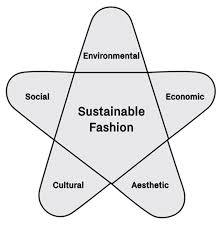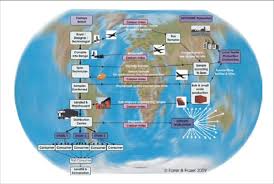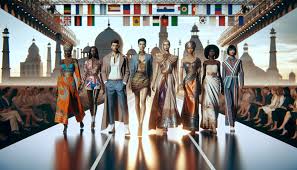Ethical Fashion and Globalization: Navigating the Complex Landscape 
The intersection of ethical fashion and globalization represents a dynamic and complex relationship that has significant implications for consumers, brands, and the broader global economy. As the fashion industry continues to expand across borders, the demand for ethically produced and sustainable garments is rising. This exploration delves into the concepts of ethical fashion and globalization, the challenges and opportunities they present, and how they shape the future of the industry.
Understanding Ethical Fashion
What is Ethical Fashion?
Ethical fashion refers to clothing, accessories, and footwear produced under fair labor conditions, with respect for human rights and the environment. This includes considerations such as:
- Fair Labor Practices: Ensuring that workers are paid fairly, work in safe conditions, and are not subjected to exploitation or discrimination.
- Sustainable Materials: Using environmentally friendly materials that reduce harm to the planet, such as organic cotton, recycled fabrics, and biodegradable materials.
- Transparency: Brands are increasingly expected to disclose their supply chains, providing consumers with information about where and how products are made.
The Rise of Ethical Fashion
The ethical fashion movement has gained momentum in recent years, spurred by heightened awareness of the social and environmental impacts of the fashion industry. High-profile events, such as the Rana Plaza collapse in 2013, which killed over 1,100 garment workers in Bangladesh, galvanized public consciousness around the ethical implications of fast fashion. Consumers began to demand more transparency and responsibility from brands, leading to a shift towards ethical fashion.
The Role of Globalization in Fashion
What is Globalization?
Globalization refers to the increasing interconnectedness of economies, cultures, and societies across the globe. It encompasses various dimensions, including economic trade, cultural exchange, and technological advancements that facilitate the movement of goods and ideas.
The Impact of Globalization on Fashion
Globalization has transformed the fashion industry in several ways:
- Supply Chain Expansion: Brands can source materials and labor from various countries, often seeking the lowest production costs. This has led to the rise of fast fashion, characterized by rapid production cycles and low-priced garments.
- Cultural Exchange: Globalization allows for the exchange of cultural influences in fashion, resulting in diverse styles and trends that reflect a global aesthetic.
- Access to Markets: Brands can reach international consumers through e-commerce, expanding their customer base beyond local markets.
The Intersection of Ethical Fashion and Globalization
Challenges Posed by Globalization
While globalization has created opportunities for the fashion industry, it has also introduced significant challenges, particularly concerning ethical practices:
- Exploitation of Labor
The quest for lower production costs has often led to labor exploitation in developing countries, where workers may face poor working conditions, long hours, and inadequate wages. The lack of regulatory oversight in these regions can perpetuate cycles of poverty and inequality.
- Environmental Degradation

Globalization has contributed to environmental challenges, as the fashion industry is one of the most polluting sectors. The fast fashion model encourages overproduction and excessive consumption, leading to increased waste, water pollution, and carbon emissions.
- Cultural Appropriation
The global exchange of fashion ideas can sometimes result in cultural appropriation, where elements of marginalized cultures are used without understanding or respect for their significance. This raises ethical questions about representation and ownership in fashion.
Opportunities for Ethical Fashion in a Globalized World
Despite the challenges, globalization also offers opportunities for ethical fashion to thrive:
- Increased Awareness and Demand
As consumers become more educated about the impacts of their purchasing decisions, there is a growing demand for ethical and sustainable fashion. This shift is encouraging brands to adopt more responsible practices to meet consumer expectations.
- Collaboration and Innovation
Globalization fosters collaboration among brands, non-profits, and governments, leading to innovative solutions for ethical fashion. Initiatives such as the Fashion Pact and the Sustainable Apparel Coalition are examples of industry-wide efforts to promote sustainability and social responsibility.
- Technology and Transparency
Advancements in technology, such as blockchain and digital platforms, are enabling greater transparency in supply chains. Consumers can track the origins of their clothing, empowering them to make informed purchasing decisions.
Case Studies: Ethical Fashion Brands Navigating Globalization
- Patagonia
Patagonia is a pioneering brand known for its commitment to ethical and sustainable practices. The company prioritizes fair labor conditions, environmental sustainability, and transparency. Its supply chain is characterized by responsible sourcing, including the use of recycled materials and organic cotton.
Patagonia’s activism extends beyond its products; the brand advocates for environmental causes and encourages consumers to buy less through its “Worn Wear” program, promoting repair and recycling.
- Eileen Fisher
Eileen Fisher is another leader in ethical fashion, emphasizing sustainability and social responsibility. The brand implements a comprehensive sustainability strategy that includes using organic and recycled materials, ensuring fair labor practices, and promoting circularity through its take-back program.
Eileen Fisher also supports women’s empowerment initiatives globally, aligning its values with the broader goals of ethical fashion.
- Reformation
Reformation is a fast-fashion brand that has integrated sustainability into its business model. The company uses eco-friendly materials, implements energy-efficient practices, and emphasizes transparency in its supply chain. Reformation’s success demonstrates that it is possible to be trendy and environmentally conscious in a globalized market.
The Future of Ethical Fashion in a Globalized World
- Shift Towards Circular Fashion

The circular economy model emphasizes the importance of designing products for longevity, reuse, and recycling. As the fashion industry moves towards circularity, brands are focusing on reducing waste and minimizing their environmental impact. This approach can help address some of the challenges posed by globalization by promoting sustainability and ethical practices.
- Growing Consumer Activism
The rise of conscious consumerism is likely to continue shaping the future of ethical fashion. Consumers are becoming more vocal about their values and expectations, holding brands accountable for their practices. This shift will encourage more companies to adopt ethical and sustainable practices in their operations.
- Policy and Regulation
Governments and international organizations are increasingly recognizing the need for regulation in the fashion industry. Initiatives aimed at promoting ethical labor practices, environmental standards, and supply chain transparency are likely to gain traction, influencing how brands operate in a globalized marketplace.
- Education and Awareness
Educational efforts focused on ethical fashion will play a crucial role in shaping consumer behavior. As more people become aware of the impacts of their fashion choices, the demand for ethical practices will grow. Fashion institutions and organizations can foster this awareness through programs that emphasize sustainability and ethics in design and production.
Conclusion
The relationship between ethical fashion and globalization is complex, presenting both challenges and opportunities. While globalization has facilitated the expansion of the fashion industry, it has also highlighted significant ethical concerns regarding labor practices, environmental degradation, and cultural appropriation.
However, the rise of ethical fashion demonstrates that it is possible to navigate these challenges through increased awareness, innovative practices, and collaboration among stakeholders. As the demand for sustainable and ethically produced garments continues to grow, the fashion industry has the potential to evolve into a more responsible and equitable sector.
The future of ethical fashion lies in its ability to adapt to the realities of globalization while prioritizing human rights and environmental sustainability. By fostering transparency, promoting collaboration, and engaging consumers in the conversation, the fashion industry can pave the way for a more ethical and sustainable future.
: Navigating the Complex Landscape
The intersection of ethical fashion and globalization represents a dynamic and complex relationship that has significant implications for consumers, brands, and the broader global economy. As the fashion industry continues to expand across borders, the demand for ethically produced and sustainable garments is rising. This exploration delves into the concepts of ethical fashion and globalization, the challenges and opportunities they present, and how they shape the future of the industry.
Understanding Ethical Fashion
What is Ethical Fashion?
Ethical fashion refers to clothing, accessories, and footwear produced under fair labor conditions, with respect for human rights and the environment. This includes considerations such as:
- Fair Labor Practices: Ensuring that workers are paid fairly, work in safe conditions, and are not subjected to exploitation or discrimination.
- Sustainable Materials: Using environmentally friendly materials that reduce harm to the planet, such as organic cotton, recycled fabrics, and biodegradable materials.
- Transparency: Brands are increasingly expected to disclose their supply chains, providing consumers with information about where and how products are made.
The Rise of Ethical Fashion
The ethical fashion movement has gained momentum in recent years, spurred by heightened awareness of the social and environmental impacts of the fashion industry. High-profile events, such as the Rana Plaza collapse in 2013, which killed over 1,100 garment workers in Bangladesh, galvanized public consciousness around the ethical implications of fast fashion. Consumers began to demand more transparency and responsibility from brands, leading to a shift towards ethical fashion.
The Role of Globalization in Fashion
What is Globalization?
Globalization refers to the increasing interconnectedness of economies, cultures, and societies across the globe. It encompasses various dimensions, including economic trade, cultural exchange, and technological advancements that facilitate the movement of goods and ideas.
The Impact of Globalization on Fashion
Globalization has transformed the fashion industry in several ways:
- Supply Chain Expansion: Brands can source materials and labor from various countries, often seeking the lowest production costs. This has led to the rise of fast fashion, characterized by rapid production cycles and low-priced garments.
- Cultural Exchange: Globalization allows for the exchange of cultural influences in fashion, resulting in diverse styles and trends that reflect a global aesthetic.
- Access to Markets: Brands can reach international consumers through e-commerce, expanding their customer base beyond local markets.
The Intersection of Ethical Fashion and Globalization
Challenges Posed by Globalization
While globalization has created opportunities for the fashion industry, it has also introduced significant challenges, particularly concerning ethical practices:
- Exploitation of Labor
The quest for lower production costs has often led to labor exploitation in developing countries, where workers may face poor working conditions, long hours, and inadequate wages. The lack of regulatory oversight in these regions can perpetuate cycles of poverty and inequality.
- Environmental Degradation
Globalization has contributed to environmental challenges, as the fashion industry is one of the most polluting sectors. The fast fashion model encourages overproduction and excessive consumption, leading to increased waste, water pollution, and carbon emissions.
- Cultural Appropriation
The global exchange of fashion ideas can sometimes result in cultural appropriation, where elements of marginalized cultures are used without understanding or respect for their significance. This raises ethical questions about representation and ownership in fashion.
Opportunities for Ethical Fashion in a Globalized World
Despite the challenges, globalization also offers opportunities for ethical fashion to thrive:
- Increased Awareness and Demand
As consumers become more educated about the impacts of their purchasing decisions, there is a growing demand for ethical and sustainable fashion. This shift is encouraging brands to adopt more responsible practices to meet consumer expectations.
- Collaboration and Innovation
Globalization fosters collaboration among brands, non-profits, and governments, leading to innovative solutions for ethical fashion. Initiatives such as the Fashion Pact and the Sustainable Apparel Coalition are examples of industry-wide efforts to promote sustainability and social responsibility.
- Technology and Transparency
Advancements in technology, such as blockchain and digital platforms, are enabling greater transparency in supply chains. Consumers can track the origins of their clothing, empowering them to make informed purchasing decisions.
Case Studies: Ethical Fashion Brands Navigating Globalization
- Patagonia
Patagonia is a pioneering brand known for its commitment to ethical and sustainable practices. The company prioritizes fair labor conditions, environmental sustainability, and transparency. Its supply chain is characterized by responsible sourcing, including the use of recycled materials and organic cotton.
Patagonia’s activism extends beyond its products; the brand advocates for environmental causes and encourages consumers to buy less through its “Worn Wear” program, promoting repair and recycling.
- Eileen Fisher

Eileen Fisher is another leader in ethical fashion, emphasizing sustainability and social responsibility. The brand implements a comprehensive sustainability strategy that includes using organic and recycled materials, ensuring fair labor practices, and promoting circularity through its take-back program.
Eileen Fisher also supports women’s empowerment initiatives globally, aligning its values with the broader goals of ethical fashion.
- Reformation
Reformation is a fast-fashion brand that has integrated sustainability into its business model. The company uses eco-friendly materials, implements energy-efficient practices, and emphasizes transparency in its supply chain. Reformation’s success demonstrates that it is possible to be trendy and environmentally conscious in a globalized market.
The Future of Ethical Fashion in a Globalized World
- Shift Towards Circular Fashion
The circular economy model emphasizes the importance of designing products for longevity, reuse, and recycling. As the fashion industry moves towards circularity, brands are focusing on reducing waste and minimizing their environmental impact. This approach can help address some of the challenges posed by globalization by promoting sustainability and ethical practices.
- Growing Consumer Activism
The rise of conscious consumerism is likely to continue shaping the future of ethical fashion. Consumers are becoming more vocal about their values and expectations, holding brands accountable for their practices. This shift will encourage more companies to adopt ethical and sustainable practices in their operations.
- Policy and Regulation
Governments and international organizations are increasingly recognizing the need for regulation in the fashion industry. Initiatives aimed at promoting ethical labor practices, environmental standards, and supply chain transparency are likely to gain traction, influencing how brands operate in a globalized marketplace.
- Education and Awareness
Educational efforts focused on ethical fashion will play a crucial role in shaping consumer behavior. As more people become aware of the impacts of their fashion choices, the demand for ethical practices will grow. Fashion institutions and organizations can foster this awareness through programs that emphasize sustainability and ethics in design and production.
Conclusion
The relationship between ethical fashion and globalization is complex, presenting both challenges and opportunities. While globalization has facilitated the expansion of the fashion industry, it has also highlighted significant ethical concerns regarding labor practices, environmental degradation, and cultural appropriation.
However, the rise of ethical fashion demonstrates that it is possible to navigate these challenges through increased awareness, innovative practices, and collaboration among stakeholders. As the demand for sustainable and ethically produced garments continues to grow, the fashion industry has the potential to evolve into a more responsible and equitable sector.
The future of ethical fashion lies in its ability to adapt to the realities of globalization while prioritizing human rights and environmental sustainability. By fostering transparency, promoting collaboration, and engaging consumers in the conversation, the fashion industry can pave the way for a more ethical and sustainable future.

